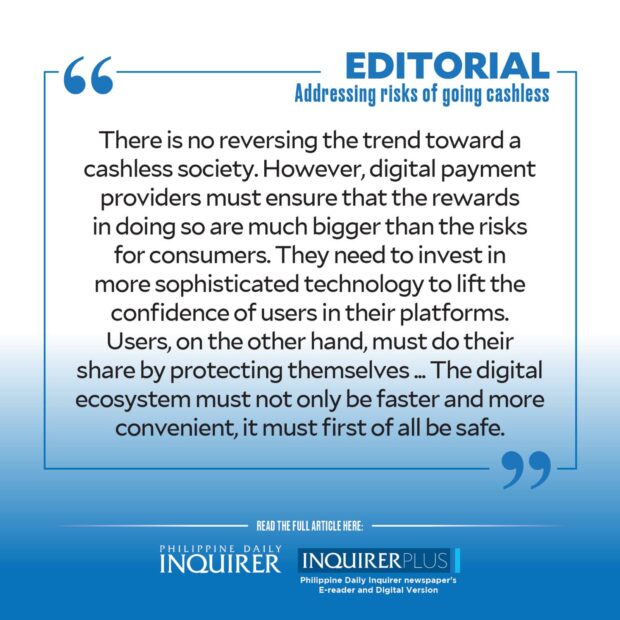Addressing risks of going cashless

A study released last week by leading credit card company Visa showing that more Filipinos are using digital modes for their transactions is proof that the country is moving toward the cashless society envisioned by the Bangko Sentral ng Pilipinas (BSP).
Its Consumer Payment Attitudes Study found that for every 10 purchases, cash payments were down to 6.4 last year compared to 7.8 in 2021. As for the most preferred cashless payment options, 89 percent used mobile wallets such as GCash and Maya, while 70 percent went for credit and debit card payments.
According to the study, Filipinos use mobile wallets for speed and convenience when settling payments. However, the fast pace of adoption by consumers without the requisite safeguards from providers of the digital platforms and the users themselves can create a risky situation. Cybercriminals seem to always be a step ahead, crafting newer, more sophisticated ways to steal people’s money.
This increasing use of digital payment apps has unfortunately widened the hunting grounds of scammers. From 2019 to 2021, the BSP noted that some P2 billion had been lost to digital banking fraud such as hacking and phishing, based on consumer complaints it received.
These incidents increased at an alarming rate during the pandemic as consumers were forced to shift to digital financial channels because of mobility restrictions.
Among the well-publicized scams include the “Mark Nagoyo” bank hacking that affected more than 700 clients of BDO Unibank in December 2021. Then there are the cases of unauthorized transactions in the Land Bank payroll accounts of several teachers and staff of the Department of Education and the latest GCash fiasco on the unauthorized deductions in account balances of several users.
As Visa country manager Jeff Navarro has noted, this necessitates the need to further educate users to protect them from cyber scams, and for digital platform providers to boost investments for protection.
In its 2023 State of Omnichannel Fraud Report released last April, credit agency TransUnion noted the Philippines was among the countries where cyber threats remained pervasive. It reported that 8.7 percent of digital transactions were suspected to be fraudulent last year, the third highest among all countries included in the study.
“[The] Philippines’ digital fraud rate still stands at a much higher level than the global average, leaving no room for complacency,” said Amrita Mitra, chief operating officer at TransUnion Philippines.
“As fraudsters become increasingly sophisticated, businesses must continue to equip themselves with the proper tools to detect fraud at the first warning sign without inhibiting the consumer journey.”
The mandatory SIM (subscriber identity module) card registration will also not totally cure the problem. Last February, cybersecurity firm Fortinet warned against hackers finding other attack methods as they shift away from phishing attempts via mobile messages.
“Instead of using SMS (short message service) phishing, they (hackers) will use Telegram, they will use WhatsApp, they will use email more,” Jonas Walker, director at Fortiguard Labs of Fortinet, recently told the Inquirer. “It is just using the same techniques but in different channels.”
The solution, according to Walker, is to raise awareness against phishing as this is still the best way to go for subscribers to protect themselves.
Consumers are well advised to go back to the Bangko Sentral module on fraud and scam prevention to check the things to look out for in a phishing scam, including generic greetings, misspellings, and even wrong grammar, a link to a spoofed website, and usually an urgent message persuading the recipients to update their account immediately.
Again, never provide personal information, account details, or passwords, especially via email. They should also update their gadgets’ security and antivirus features. They must likewise avoid installing software and apps they are not familiar with, and be cautious in using public computers and free Wi-Fi connections.
Activating a two-step verification process such as the one-time password protocol or multifactor authentication, including facial recognition, will also increase their protection. Digital solutions companies need to engage the education sector to start awareness early among children.
There is no reversing the trend toward a cashless society. However, digital payment providers must ensure that the rewards in doing so are much bigger than the risks for consumers. They need to invest in more sophisticated technology to lift the confidence of users in their platforms.
Users, on the other hand, must do their share by protecting themselves, and the government needs to speed up the implementation of the much-delayed national ID system to help address the problem of authentication, which banks noted was one of the difficulties in going digital.
The digital ecosystem must not only be faster and more convenient, it must first of all be safe. A vigorous and sustained education program to raise awareness of the dangers of online payments will do much to achieve this.
















